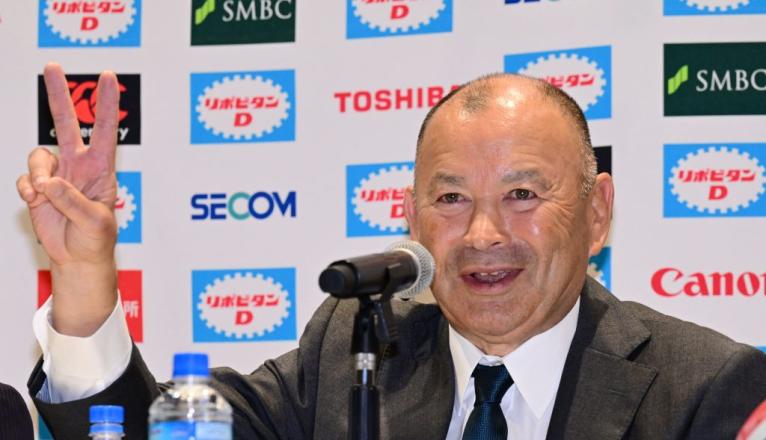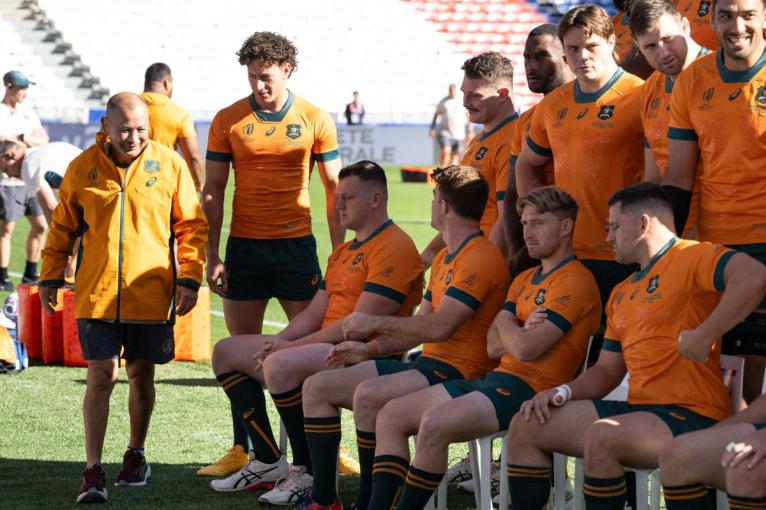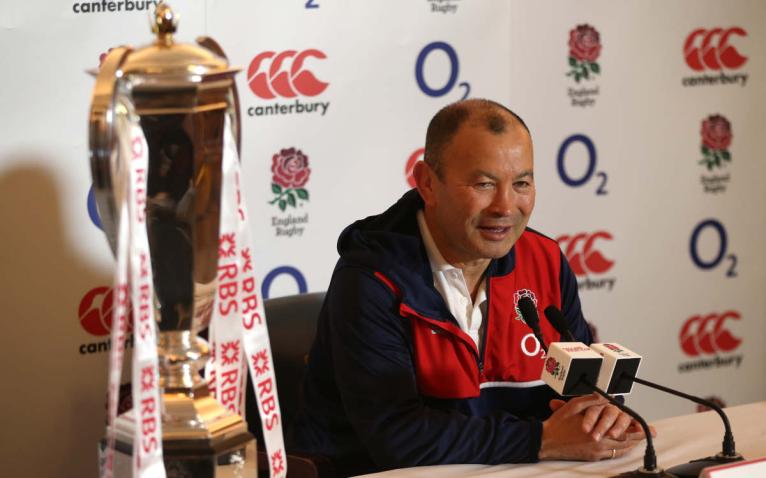It could all have been so very, very different. If Japan had not scored in the fifth minute of overtime, in the dying embers of the pool game against the mighty Springboks at the 2015 World Cup, Eddie Jones never would have had the platform to extend his coaching lifetime at the highest level of the game. By such fine margins careers rise or fall.
Suddenly Jones was flavour of the month once more, and his genius for self-promotion hustled to centre stage. All comers, willing or unwilling, were barged out of the spotlight as Eddie’s Japan became the talk of the town.
“We haven’t come here just to have one splash in the pond,” he said. “When we came here we had two targets – to make the quarter-finals, and to be the team of the tournament. And we’ve not made a bad start.”
The fact Japan lost their very next game to Scotland decisively 45-10 and never made the knockout stages was brushed under the carpet in the media stampede to anoint Eddie the coaching genius, the man who had been scheming to beat the Boks for over three years. Jones himself could scarcely contain his glee at the exponential renewal of his profile as a rugby guru, quipping: “I can be like Clive Woodward and tell everyone what to do on television. Tell Sir Clive I want to be like him. That’s my dream.”

Eight years later the wheel has come full circle, and Eddie Jones is back where he started, as the head coach of Japan. It has been a wild ride in between times. Jones led England to a World Cup final in 2019 and Australia through a disastrous campaign in the same competition four years later. After repeatedly denying media reports throughout the 2023 World Cup that he was heading back to his maternal homeland immediately after the tournament, despite a five-year deal worth AUD $4.5m with Rugby Australia, that is exactly what happened.
The saga left honourable Australian rugby men such as Wallaby centurion Stephen Moore squirming in their seats.
“It almost became untenable with both those guys [Jones and RA chairman Hamish McLennan],” he said. “It’s good to be out the other side of that.
“It was a pretty unfortunate time, the last 12 months for Australian rugby.
“We just need to have the best coach, and it’s no secret we haven’t been great at developing our own coaches.
It would be wise to cast a wide net and pick the absolute best [option] possible. If that’s Joe Schmidt that’s great, if that’s Ronan O’Gara that’s great, and if it’s Dan McKellar that’s great too. We need to go through that process, and we didn’t do that with Eddie. It probably came back to bite us.
Stephen Moore, former Wallaby captain
“So, you need to look outside. It would be wise to cast a wide net and pick the absolute best [option] possible.
“If that’s [New Zealander] Joe Schmidt that’s great, if that’s [Irishman] Ronan O’Gara that’s great, and if it’s [Australian] Dan McKellar that’s great too.
“We need to go through that process, and we didn’t do that with Eddie. It probably came back to bite us.”
Which version of Eddie Jones are we to believe? The genius who owns the highest winning percentage of any England coach in history at 73%, turning around a side which failed to emerge from the 2015 pool stage into a ‘picking machine’ which won 25 of its first 26 Tests on the way to three Six Nations titles, one Grand Slam and a World Cup final against South Africa? With England, Jones stayed to the very end, and a walk to the guillotine he knew was coming.

Does the shambolic return of the prodigal son to Australia in 2023 carry more weight? Promising a Wallaby feast at the World Cup, despite a winless Rugby Championship and World Cup warm-up appetiser; registering only two wins [against Portugal and Georgia] in nine attempts and crashing out of his specialty tournament after catastrophic pool losses to Wales and Fiji. The catering service at that banquet quite simply never turned up.
Genius or court jester? Master-coach or pied piper? Both can be true. Eddie is an enigma, and can comfortably contain both in his psychological make-up. I frequently found myself on the opposite side to him in the early noughties, as advisor to Graham Henry on the 2001 British and Irish Lions tour of Australia when he was emerging as the Wallaby attacking mastermind, and as analyst for Wales for his last match in charge of the Wallabies in 2005. I did not meet the man in the flesh until December 2015 at England’s Pennyhill Park training base.
I dumped an imposing 75-page analysis of Scotland (England’s first opponents in the 2016 Six Nations) on the table and he brushed it aside. “Nah mate. I’ve got enough people doing analysis for me already.”
He was super-confident and I formed the impression he already knew the answers to every question he was supposed to be asking me. I dumped an imposing 75-page analysis of Scotland (England’s first opponents in the 2016 Six Nations) on the table and he brushed it aside. He wanted ‘nut’ not ‘shell’ – tactical appreciation and concentrated essences, not the fleshings-out: “Nah mate. I’ve got enough people doing analysis for me already.”
Six years later, he contacted me again out of the blue, to chew the fat at the darkest hour of his time with England. Two weeks later, he was given the boot by the RFU and another proposal fell by the wayside. That odd history of random rendezvous and sudden dispersals nonetheless left me with a definite impression: a fast-acting genius who could put plans together with outstanding speed and accuracy; but also, a breakneck intelligence which could just as easily cause burn-out and leave others in ruins around him.
There was the potential for very quick positive transformations in the short term, but a shrinking chance of stability in the long run. Is that not the real coaching story of Australia’s 2023 World Cup? A head guru who was too intent on ‘transforming’ in a year when ‘stabilising’ was required? Eddie could not help himself. He had to kick-start change, not at that start of new cycle when it was most appropriate, but at the culmination when the fruits of the previous four years were coming to maturity.

At his best, he possessed a razor-sharp analytical attacking mind which smells out weakness, which sees the big picture and the detail within it at one and the same time. As his long-time confederate with England, Steve Borthwick commented: “It’s down to his analysis. When he was a player he never had his head out of the computer, and as a coach he never has it out. He knows lineouts better than anyone else I know. He can pick a weakness, an opportunity, and it’s just about drilling the players. He’s done that superbly [with England].”
It is also why an Eddie Jones team on the up always shows its premium wares right at the start of the game, and typically in the early phase of his reign. Remember Australia’s first scrum at the 2003 World Cup final versus England?
The Wallabies’ tactical architect had anticipated that England’s nominal full-back ( number 15 Josh Lewsey) would swap spots with number 14 Jason Robinson, with Lewsey playing in the line and ‘Robbo’ covering in the backfield from scrum. Jones immediately applied the solution via his on-field brain Stephen Larkham. The cross-kick to the far wing is inch-perfect and there is nothing 5ft 8ins of Robinson can do to stop 6ft 4ins Lote Tuqiri catching the ball and flopping over. England’s defence coach Phil Larder remembered Clive Woodward shooting him a filthy look in the coaching box: “How are we going to stop that, if they try it again?”
Wind the clock on another 15 years, to England first encounter with the All Black under Jones in 2018.
It’s impossible to appreciate the tactical subtlety of Eddie’s expert manipulation of the New Zealand backfield until you freeze-frame the ruck before the try.

All but two of the All Blacks defenders swing back to the wide side when they see the England backs, bar one, regrouping in that area. In fact, it is just a ruse to release England number 14 Chris Ashton down the right sideline untouched. Jones must have seen a reactive element in the Kiwi backfield he felt he could exploit, and he creates just the right move to expose it.
The 2019 World Cup semi-final against the same opponents in Yokohama probably represents Jones’ peak tactical achievement in his eight-year renaissance between 2015 and 2023. Once again the beginnings were crucial to the overall picture he wanted to paint. From the opening lineout on the halfway line, England made a statement of intent with ball in hand.
At least for his first four years in charge, Eddie’s England were unafraid to undertake that most un-English of strategies: attacking right from the start, with no risk-averse, preparatory ‘grinding-down’ up front; spreading the ball wide-wide in the space of three phases, inside the first minute of the match against the reigning world champions.
Eddie also had tight forwards such as Courtney Lawes and Kyle Sinckler offloading the ball, with his fly-half George Ford playing tight behind them.
A couple of phases later, the man who started it all with the first carry, centre Manu Tuilagi, finished it with the final plunge over the line. Six rucks and sixteen passes hitting two sidelines in a perfect minute of attacking rugby. It was Eddie Jones to a tee.
“I don’t know what you’re talking about mate,” was Jones’ retort after a reporter asked him about an alleged meeting-interview for the Japan gig during the World Cup. At the time, Jones was committed to the Wallabies on a five-year contract and in the middle of the biggest tournament in the sport.
Only 12 short months separated Jones’ sacking by the RFU, his welcome home to Australia, and his return to the place his latest coaching journey started, in the Land of the Rising Sun. He is probably the only coach who can accommodate such a bewildering sequence of arrivals and departures, sunrises and sunsets, working in a world of lightning speed, and sudden contradiction. Maybe the true destination was always Japan. If so, they are Brave Blossoms indeed. Who knows? The number of those who can keep up Eddie Jones are few and far between.



Comments
Join free and tell us what you really think!
Sign up for free